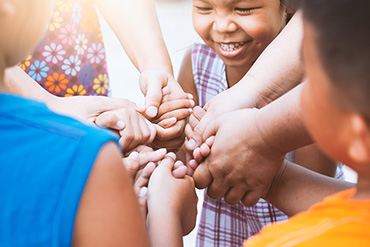Practice Note on Beliefs and Biases
Learning about beliefs and biases
It is critical to learn about the beliefs and biases that underpin:
- your thoughts, behaviours and actions;
- your decision-making processes;
- your professional judgment;
- how you communicate, collaborate and socialize with others who hold their own beliefs and biases;
- the pedagogical observations and documentation that inform curriculum; and,
- how you develop and implement policies, programs and services for children and families with your colleagues.
As an RECE, you are responsible for co-creating physical and social environments that respect and value all members of the community.

Ethic A says that RECEs make the well-being, learning and care of children their primary focus while creating learning environments where their rights are valued and they can all experience a sense of belonging and inclusion.
One way to uphold this responsibility is to engage in an important element of lifelong learning: critical reflection. Looking inwardly and learning more about our beliefs and biases can be uncomfortable; however, without that awareness, we may also be unaware of the potential harms that result when these biases inform our decisions and actions.
Critical reflection is defined in the Code of Ethics and Standards of Practice (2017) as a “way of reflecting that requires RECEs to consider and challenge the beliefs, assumptions and understandings that frame how they view and respond to children and that shape learning experiences they make available for them. Critical reflection involves the active process of engaging with difficult concepts, tensions and uncertainties and changing practice as a result.”
RECEs engage in critical reflection, both individually and collaboratively. Intentional critical reflection can involve engaging with some difficult concepts and may:
- expose ways that power structures operate and oppress peoples and groups;
- lead you to question familiar and/or longstanding knowledge and practices;
- reveal elements of ourselves that we find difficult to acknowledge or change;
- bring up uncomfortable emotions;
- make us aware that we need to further engage and learn with families and communities;
- open up different viewpoints, knowledge and perspectives; and,
- draw our attention to a need to change, acquire knowledge and reframe our thinking and practice.
These conversations are complex. Adding an additional layer is that children, families and colleagues hold their own beliefs based on their experiences, the information and knowledge they have, and the historical, political, social and cultural context in which they are situated. This means they will have similar and differing beliefs about many of the following practice-related areas:
- children and childhood;
- teaching and learning;
- families and parenting;
- social and cultural groups; and,
- equity, diversity and inclusion.
To support you in the reflection process and in co-creating inclusive and respectful learning environments, it may be helpful to learn more about the historical, social and political structures that influence beliefs and biases.
By acquiring knowledge about how privilege and power operates to marginalize certain people or groups, RECEs can identify actions that may cause harm.
What are some ways in which you can do this? Try taking action in some of the following ways:
- engage in critical reflection on all policies and practices using anti-biased and anti-racist approaches;
- involve members of diverse communities and groups to include various perspectives;
- work with others to revise and develop anti-biased and anti-racist policies, practices, pedagogy and curriculum;
- talk about and address racism and discrimination with children and families, as well as colleagues and community members;
- support children to develop the language and actions they need to advocate for change; and,
- model an anti-biased and anti-racist approach in all that you do, including being accountable for your decisions and actions, and supporting colleagues in being accountable for theirs.
